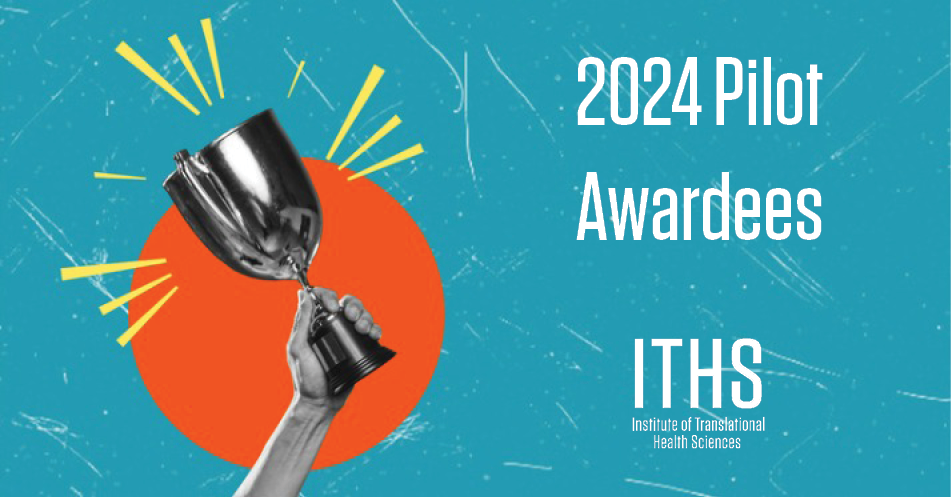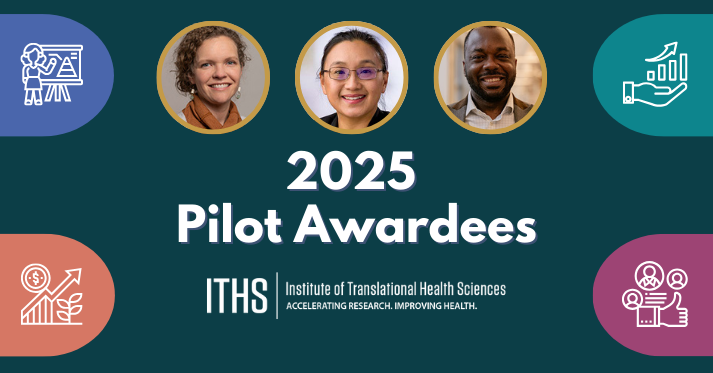
24 Apr ITHS Announces 2024 Pilot Awardees
The Institute of Translational Health Sciences is delighted to announce the 2024 Pilot Award recipients. The Pilot program is designed to inspire innovative and collaborative research aimed at improving overall human health. This year’s awardees were selected from a diverse group of applicants whose research span across translational science spectrum, including basic research, clinical implementation, public health, and clinical and pre-clinical research.
Pilot funding allows investigators to obtain preliminary data in order to establish a proof of concept and seek larger funding amounts. Investigators supported by the Pilot Program are expanding knowledge in Indigenous Community health care, blood transfusions, cardiac health, pregnancy, and support for formerly incarcerated parents.
You can learn more about all of the awards ITHS offers and past recipients on our Funding Opportunities page.
This Year’s Awardees
ITHS offered three categories of pilot funding for 2024: Early-Stage Product Development, and Translation Research Partnership Awards for Academic Community Partnerships and for New Interdisciplinary Academic Collaborations.
Early-Stage Product Development Award
This award is designed to help translate clinically relevant research discoveries toward development of commercial products that improve human health. Projects should be designed to demonstrate or strengthen critical evidence that the envisioned product accomplishes its health-related purpose with respect to safety, efficacy, scalability, feasibility or clinical utility (i.e., proof of concept).
This year, we awarded two teams the Early-Stage Product Development Award.
- Dr. Princess Imoukhuede and Dr. Cheri Fang of the University of Washington School of Engineering receive the award for a project entitled “A blood test for preeclampsia prediction.”
- Dr. Jonathan Posner from the UW Schools of Engineering and Medicine and Dr. John Gore of the UW Medicine Department of Urology will collaborate on their project “CathConnect.”
Translational Research Partnership Award for Academic Community Partnerships
This awards supports collaborations between academic and community investigators in projects that investigate a community-based health problem, disseminate evidence-based health innovations into practice, target health promotion or prevention, or examine ways to enhance or implement sustainable health programs in community settings. Applications that propose research to plan or implement a new intervention or innovation in clinical settings are especially encouraged for this award.
This year there are two recipients of the Academic Community Partnerships award.
- Cornelia “Connie” Jessen of the Alaska Native Tribal Health Consortium will partner with the Metlakatla Indian Community on their project, “Piloting the 49 Days of Ceremony Health and Wellness Intervention.”
- Dr. Liliana Lengua, Director of the UW Center for Child and Family Well-Being, will work with the King County Community Partnership for Transition Solutions on their project, “A Task-sharing Approach to Supporting Parents Re-entering the Community after Incarceration.”
Translational Research Partnership Award for New Interdisciplinary Academic Collaborations
This award is designed to encourage and support the formation and development of partnerships in projects that address critical transitions in translational research in innovative ways, with the potential to become long-term collaborations showing a deep commitment to a common goal.
ITHS is giving these awards to two new teams this year.
- Dr. Patrick M. Boyle of UW Bioengineering and Dr. Babak Nazer of the UW Medicine Division of Cardiology will be collaborating on a project called “AI-Powered Personalized Risk Stratification for Lethal Cardiac Events in Patients with Repaired Tetralogy of Fallot.”
- Dr. Li Amily Guo of UW Hematology & Oncology and Bloodworks NW will work together with Dr. Nathan Sniadecki from UW Mechanical Engineering, on their project, “L-plastin Strategy for In Vitro Generation of Platelet Transfusion Units.”

















